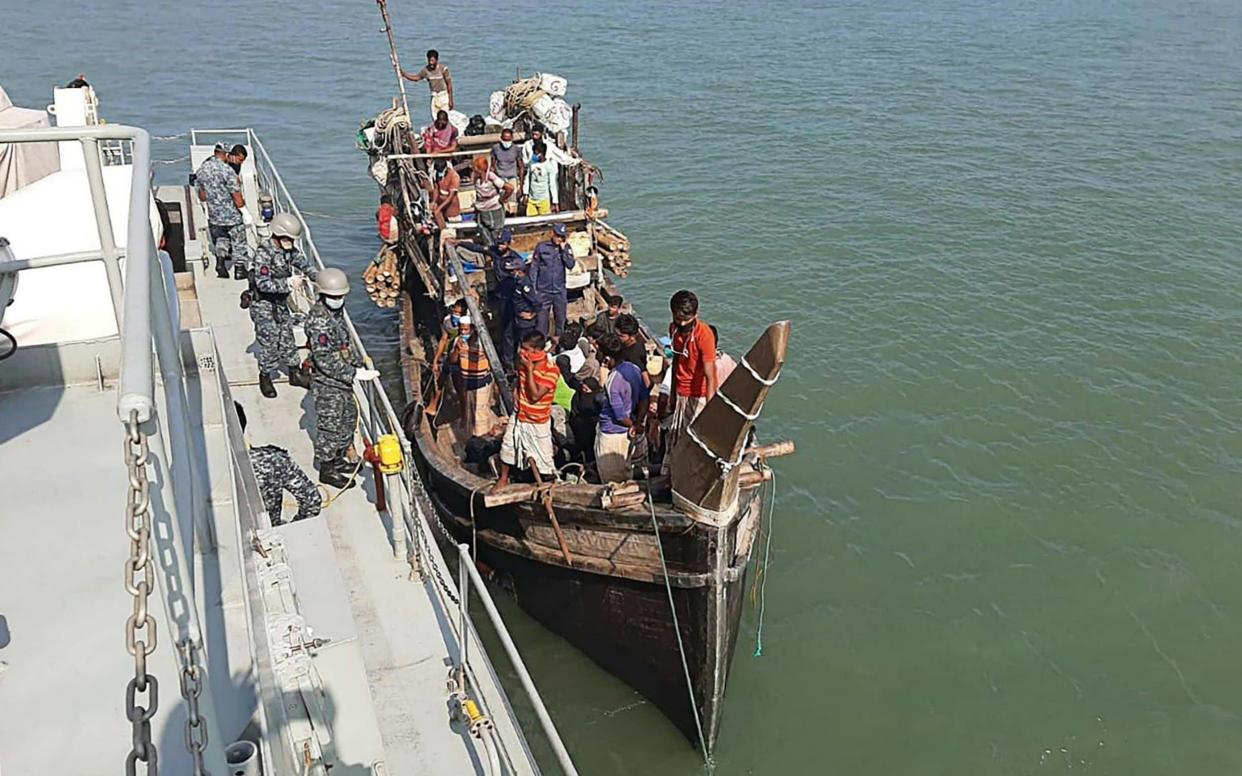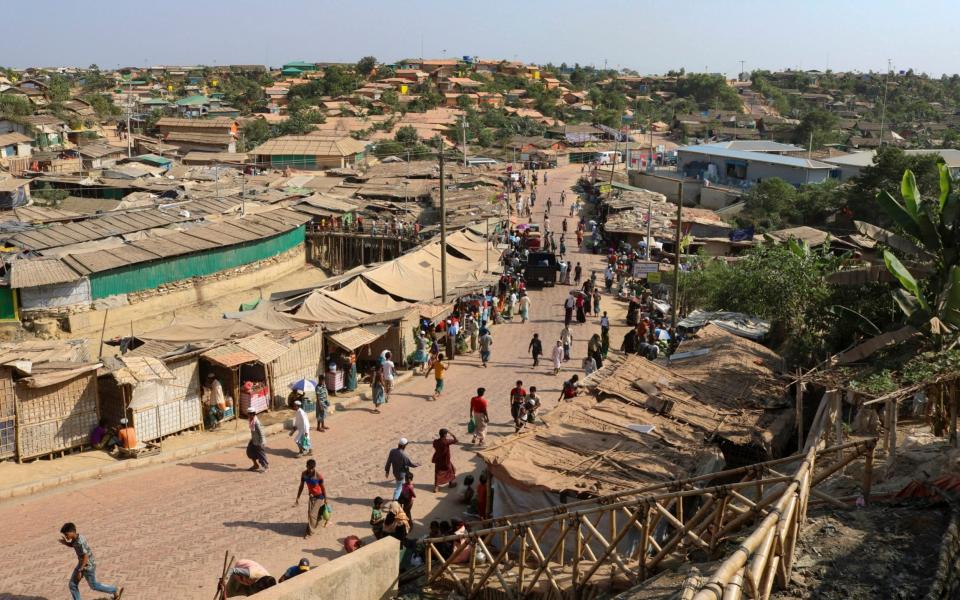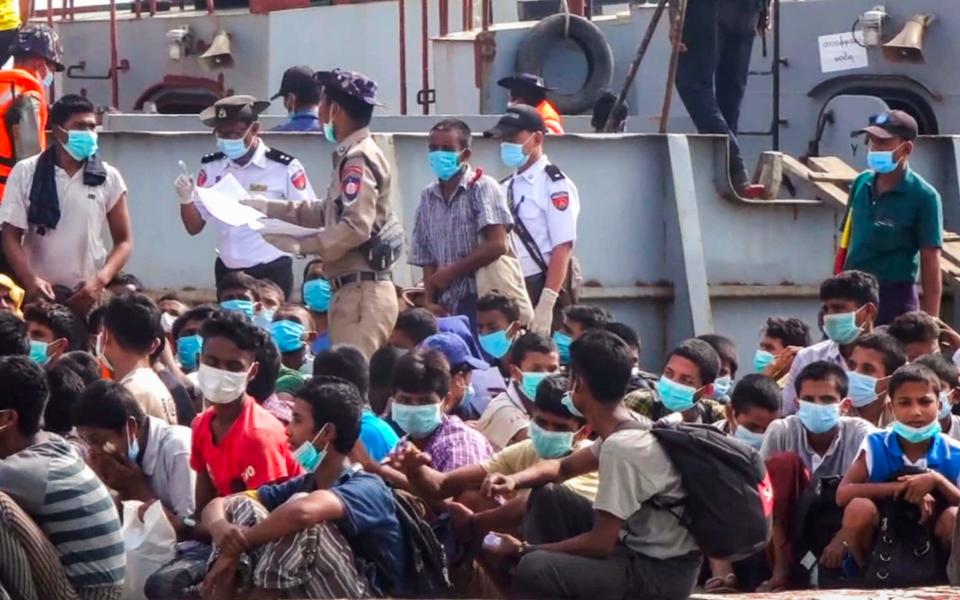Rescued from boats, Bangladesh sends desperate Rohingya to 'prison' island in Bay of Bengal

At first, Rohingya refugee Mohammed Shobbir Ahmed was relieved when he received a 4am call on Saturday that his teenage daughters had arrived safely back on Bangladeshi shores after spending weeks in peril adrift at sea.
But his anguish returned when he learned their attempted flight from the squalid refugee camp near Cox’s Bazar to a better life in Malaysia had resulted in them being banished to Bhasan Char, a remote cyclone-prone silt island in the Bay of Bengal that aid agencies have not yet cleared for habitation.
“I received a phone call from an unknown number the day the boat landed in Cox’s Bazar. My daughter said that while trying to reach land, they had been arrested and were being sent somewhere,” the 48-year-old father told The Telegraph.
“She said ‘we are on the boat. We heard that they are sending us to Bhasan Char,’” he said. He now fears he will never be reunited with his children Imtiaz Begum, 19, and Shawkat Ara Begum, 17.
The Bangladeshi authorities have since confirmed that a group of up to 29 refugees, among them reportedly women and children, have been transferred to the controversial island in the Bay of Bengal.
They are believed to be part of a larger group of up to 350 refugees still stranded at sea after trying to flee desperate conditions in the world’s largest refugee camp, Kutupalong, which houses more than one million Rohingya who fled a brutal campaign of ethnic cleansing by the Myanmar army.
The United Nations has warned that those still afloat face another “human tragedy of terrible proportions” as countries chase them from their coastlines. In April, some 70 people tragically starved to death as they drifted aimlessly across open waters.

But human rights groups fear the Bangladeshi government may use the refugees’ plight and fears about the spread of Covid-19 to start enacting their long-held ambition to relocate about 100,000 refugees to the muddy silt islet, bypassing aid agencies’ concerns about living conditions.
Dhaka argues that the relocation would take pressure off the overcrowded border camp in Cox’s Bazar and has constructed living quarters and a nine-foot high embankment around the island - which only emerged about two decades ago - to keep out tidal surges during cyclones.
Opponents of the move have likened Bhasan Char to a prison with limited health and education facilities. They warn that powerful cyclones in the past half a century have killed hundreds of thousands of people in the Meghna river estuary where the island is located.
Rohingya communities have resisted attempts to force them onto the island and the long-standing request of the UN refugee agency (UNHCR) - that comprehensive technical and protection assessments must be carried out before anyone is moved there - so far remains unfulfilled.
Phil Robertson, deputy Asia director for Human Rights Watch, said the decision to drop the rescued boatload on Bhasan Char was “clearly a shift in Bangladesh policy” and accused the authorities of using the excuse that the refugees were “new arrivals” who came from Myanmar rather than the camp.
“While the Bangladesh government maintained the 29 were just being sent there for quarantine, it's looking more like a one-way ticket to this remote, de facto detention island,” he said.
“The next likely step will then be to pressure the family members of the 29 Rohingya at Bhasan Char to agree to go to the island if they want to reunite with their relatives,” he added, predicting that the pattern would be repeated with others rescued from boats until there was a starter community on the island.

One unnamed Rohingya refugee in Kutupalong told Human Rights Watch that a government official on Bhasan Char told his daughter that “your parents will be brought here.”
The man said: “We did not care how much we had to pay to get our daughters back, but now there is uncertainty about whether they will return from Bhasan Char, or whether we will also be forced to relocate there by Bangladesh authorities.”
Amnesty International has joined the calls for humane treatment of Rohingya refugees.
"While the Rohingya need safe disembarkation immediately for a chance to survive, taking them to any remote island away from families, treatment, protection and humanitarian facilities, can amount to more distress," said Saad Hammadi, South Asia Campaigner.
Iqbal Sobhan Chowdhury, a Bangladeshi government spokesman, denied that there had been a change in policy and said the authorities were putting the safety of refugees first.
“The Covid-19 pandemic has necessitated shifting of some refugees from the camps where they are living without maintaining social distance and that poses risks for the community transmission of the deadly virus,” he told The Telegraph.
“One can understand how disastrous it would be if the virus spreads in the densely populated [camps] where more than a million refugees are now living. The government is taking this measure only to contain the spread of the virus and save the lives of refugees.”
Mr Chowdhury said the move had been done with the knowledge of international agencies working in the camp.
However, UNHCR said that preparations had been made to ensure the safe quarantine of refugees arriving by boat in Cox’s Bazar.
A group of some 400 Rohingya refugees who left Bangladesh by boat only to return in distress over a fortnight ago have now returned to their families in Kutupalong after a required 14-day quarantine period. None had shown any symptoms of Covid-19.

